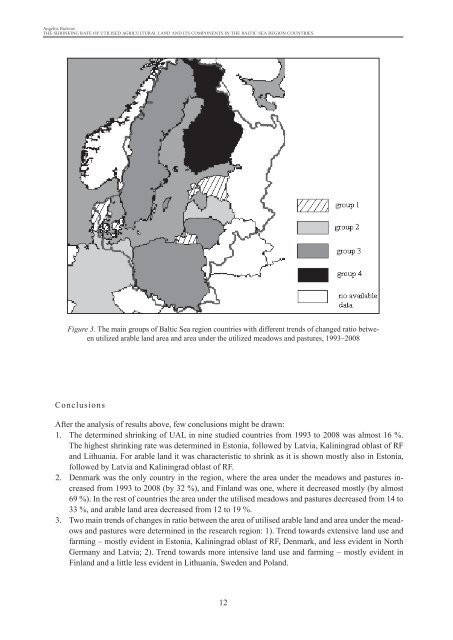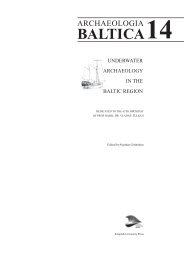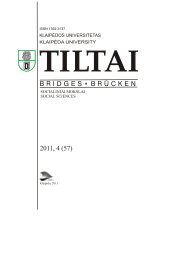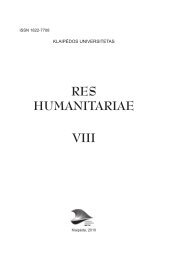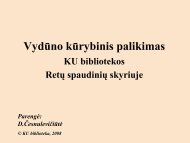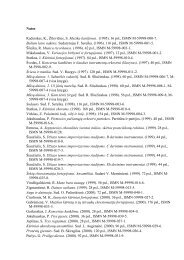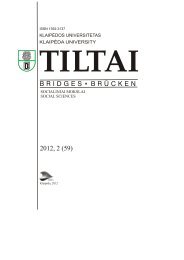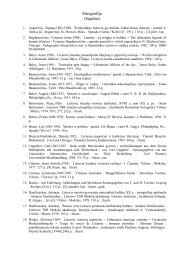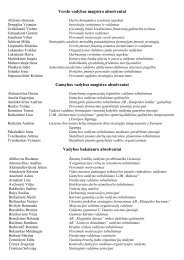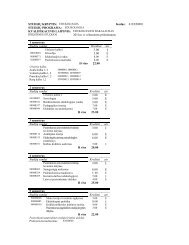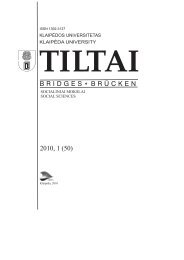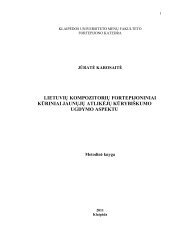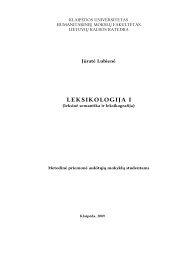Angelija Bučienė THE SHRINKING RATE OF UTILISED AGRICULTURAL LAND AND ITS COMPONENTS IN THE BALTIC SEA REGION COUNTRIES Figure 3. The main groups of Baltic Sea region countries with different trends of changed ratio between utilized arable land area and area under the utilized meadows and pastures, 1993–2008 Conclusions After the analysis of results above, few conclusions might be drawn: 1. The determined shrinking of UAL in nine studied countries from 1993 to 2008 was almost 16 %. The highest shrinking rate was determined in Estonia, followed by Latvia, Kaliningrad oblast of RF and Lithuania. For arable land it was characteristic to shrink as it is shown mostly also in Estonia, followed by Latvia and Kaliningrad oblast of RF. 2. Denmark was the only country in the region, where the area under the meadows and pastures increased from 1993 to 2008 (by 32 %), and Finland was one, where it decreased mostly (by almost 69 %). In the rest of countries the area under the utilised meadows and pastures decreased from 14 to 33 %, and arable land area decreased from 12 to 19 %. 3. Two main trends of changes in ratio between the area of utilised arable land and area under the meadows and pastures were determined in the research region: 1). Trend towards extensive land use and farming – mostly evident in Estonia, Kaliningrad oblast of RF, Denmark, and less evident in North Germany and Latvia; 2). Trend towards more intensive land use and farming – mostly evident in Finland and a little less evident in Lithuania, Sweden and Poland. 12
ISSN 2029-9370. <strong>Regional</strong> <strong>Formation</strong> and Development Studies, No. 1 (6) References Agriculture & Fisheries. Website: http://economy.gov39.ru/en/investicionnye-vozmozhnosti/poisk-investora/poisk-pobaze/index.php (visited 10th of January, <strong>2012</strong>). Andersen, E. (ed.) (2003). Developing a high nature value farming area indicator. Internal report EEA. European Environment Agency, Copenhagen. Аtkoceviciene, V., Gudritiene, D., Dudoniene, V. (2011). The analysis on the change of farming lands in the territory of Middle Lithuania. Baltic surveiying’11. Proceedings International Scientific Conference of Agriculture Universities of Baltic States, 11th – 13th of May, 2011. Jelgava, p. 25–36. Baldock, D., Beaufoy, G., Brouwer, F., Godeschalk, F. (1996). Farming at the margins: Abandonment or redeployment of agricultural land in Europe. IEEP/LEI-DLO, London/Den Haag. Bučienė, A. (2002). Overview of rural population demographic situation, land use and spheres of activity in the Baltic Sea region. Tiltai. Brücken. Bridges. Scientific paper of Klaipėda University, vol. 2, p. 11–18. Bučienė, A. (2003). Žemdirbystės sistemų ekologiniai ryšiai. Monografija. Klaipėda: Klaipėdos universiteto leidykla. Bučienė, A. (2009). Biogenų N ir P išplova Lietuvos žemumų dirvožemiuose. Habilitacijos procedūrai teikiamų mokslo darbų apžvalga. Fiziniai mokslai, geografija (06P). Vilnius. Bučienė, A. (2010). Ecological agriculture and sustainable development in the Baltic Sea region. Human resources – the main factor of regional development, Journal of Social sciences, No. 3. Klaipėda university, p. 7–14. Contemporary changes of agriculture in East-Central Europe. (2008). J. Banski, M. Bednarek (eds.). Rural Studies, Vol. 15. Warsaw. Dobele, A. (2004). Use of land resources in Latvia. Approbation, presentation and resume of PhD Paper, Jelgava, Latvia University of Agriculture, Faculty of Economics, Department of Business and management. Website: http//www.Dobele_ang.doc (visited 9th January, <strong>2012</strong>). EEA Signals (2004). A European Environment Agency update on selected issues. Copenhagen. Website: http://www.eea.europa.eu/publications/signals-2004/ENSignals2004web.pdf (visited 11th January, <strong>2012</strong>). EEA. (2005). Agriculture and environment in EU-15 – the IRENA indicator report. Europe in figures. (2009). Agriculture, forestry and fishery – Eurostat yearbook. Kazakevičius, Z. (2011). Žemės išteklių naudojimo Lietuvos ūkininkų ūkiuose vertinimas. Management theory and studies for rural business and infrastructure development, Nr. 3 (27). Research papers, p. 94–103. Korneevets, V. (1997). Agriculture in North-Western Russia. A sustainable Baltic region. Food and Fibres. Sustainable agriculture, forestry and fishery. B. Bodin, S. Ebbersten (eds.). Swedish University of Agricultural Sciences. Uppsala University, p. 23–25. Mücher, S., Wascher, D. (2007). European landscape characterisation. Europe’s living landscapes. Essays on exploring our identity in the countryside. LANDSCAPE EUROPE / KNNV. B. Pedroli, A. Van Doorn, G. De Blust, M. L. Paracchini, D. Wascher, F. Bunce (eds.). Website: http://www.landscape-europe.net/files/37-43%2520correctie.pdf (visited 11th January, <strong>2012</strong>), p. 38–43. Nikodemus, O., Bell, S., Penēze, Z., Krūze, I. (2010). The influence of European Union single area payments and less favoured area payments on the Latvian landscape. Europ. Countrys, Vol. 1, p. 25–41. Statistics Division FAO. (2010). Website: http://www.fao.org/fileadmin/templates/ess/ess_test_folder/Publications/ yearbook_2010/a04.xls (visited on 8th January, <strong>2012</strong>). Sustainable agriculture. (<strong>2012</strong>). Ch. Jakobsson (ed.). Ecosystem Health and Sustainable Agriculture, Vol. 1. The Baltic University Programme, Uppsala University. Towards a Baltic sea unaffected by eutrophication. (2007). HELCOM Overview, HELCOM Ministerial Meeting Krakow, Poland, 15 November 2007. Website: http://www.helcom.fi/stc/files/Krakow2007/Eutrophication_MM2007. pdf (visited on 9th January, <strong>2012</strong>). Vinokurov, E. (2007). Kaliningrad: Enclaves and Economic Integration. Thinking ahead for Europe, Special Report, CEPS (Centre for European Policy Studies). Website: http://www.ceps.be (visited on 9th January, <strong>2012</strong>). Website: www.stat.gov.de Website: www.stat.gov.ee Website: www.stat.gov.fi Website: www.stat.gov.lt Website: www.stat.gov.lv Website: www.stat.gov.pl Website: www.stat.gov.se (all visited on 9th January <strong>2012</strong>). Целевая программа Калининградской области «Осножные направления развития агропромышленного комплекса Калининградской области на 2007–2016 годы». Приложение к постановлению Правительства Калининградской области от 2006 года (in Russian). 13
- Page 1 and 2: KLAIPĖDA UNIVERSITY SOCIAL SCIENCE
- Page 3 and 4: PREFACE This journal seeks to invit
- Page 5 and 6: Eduardas Spiriajevas Hindrances and
- Page 7 and 8: ISSN 2029-9370. Regional Formation
- Page 9 and 10: ISSN 2029-9370. Regional Formation
- Page 11: ISSN 2029-9370. Regional Formation
- Page 15 and 16: ISSN 2029-9370. Regional Formation
- Page 17 and 18: ISSN 2029-9370. Regional Formation
- Page 19 and 20: ISSN 2029-9370. Regional Formation
- Page 21 and 22: ISSN 2029-9370. Regional Formation
- Page 23 and 24: ISSN 2029-9370. Regional Formation
- Page 25 and 26: ISSN 2029-9370. Regional Formation
- Page 27 and 28: ISSN 2029-9370. Regional Formation
- Page 29 and 30: ISSN 2029-9370. Regional Formation
- Page 31 and 32: ISSN 2029-9370. Regional Formation
- Page 33 and 34: ISSN 2029-9370. Regional Formation
- Page 35 and 36: ISSN 2029-9370. Regional Formation
- Page 37 and 38: ISSN 2029-9370. Regional Formation
- Page 39 and 40: ISSN 2029-9370. Regional Formation
- Page 41 and 42: ISSN 2029-9370. Regional Formation
- Page 43 and 44: ISSN 2029-9370. Regional Formation
- Page 45 and 46: ISSN 2029-9370. Regional Formation
- Page 47 and 48: ISSN 2029-9370. Regional Formation
- Page 49 and 50: ISSN 2029-9370. Regional Formation
- Page 51 and 52: ISSN 2029-9370. Regional Formation
- Page 53 and 54: ISSN 2029-9370. Regional Formation
- Page 55 and 56: ISSN 2029-9370. Regional Formation
- Page 57 and 58: ISSN 2029-9370. Regional Formation
- Page 59 and 60: ISSN 2029-9370. Regional Formation
- Page 61 and 62: ISSN 2029-9370. Regional Formation
- Page 63 and 64:
ISSN 2029-9370. Regional Formation
- Page 65 and 66:
ISSN 2029-9370. Regional Formation
- Page 67 and 68:
ISSN 2029-9370. Regional Formation
- Page 69 and 70:
ISSN 2029-9370. Regional Formation
- Page 71 and 72:
ISSN 2029-9370. Regional Formation
- Page 73 and 74:
ISSN 2029-9370. Regional Formation
- Page 75 and 76:
ISSN 2029-9370. Regional Formation
- Page 77 and 78:
ISSN 2029-9370. Regional Formation
- Page 79 and 80:
ISSN 2029-9370. Regional Formation
- Page 81 and 82:
ISSN 2029-9370. Regional Formation
- Page 83 and 84:
ISSN 2029-9370. Regional Formation
- Page 85 and 86:
ISSN 2029-9370. Regional Formation
- Page 87 and 88:
ISSN 2029-9370. Regional Formation
- Page 89 and 90:
ISSN 2029-9370. Regional Formation
- Page 91 and 92:
ISSN 2029-9370. Regional Formation
- Page 93 and 94:
ISSN 2029-9370. Regional Formation
- Page 95 and 96:
ISSN 2029-9370. Regional Formation
- Page 97 and 98:
ISSN 2029-9370. Regional Formation
- Page 99 and 100:
ISSN 2029-9370. Regional Formation
- Page 101 and 102:
ISSN 2029-9370. Regional Formation
- Page 103 and 104:
ISSN 2029-9370. Regional Formation
- Page 105 and 106:
ISSN 2029-9370. Regional Formation
- Page 107 and 108:
ISSN 2029-9370. Regional Formation
- Page 109 and 110:
ISSN 2029-9370. Regional Formation
- Page 111 and 112:
ISSN 2029-9370. Regional Formation
- Page 113 and 114:
ISSN 2029-9370. Regional Formation
- Page 115 and 116:
ISSN 2029-9370. Regional Formation
- Page 117 and 118:
ISSN 2029-9370. Regional Formation
- Page 119 and 120:
ISSN 2029-9370. Regional Formation
- Page 121 and 122:
ISSN 2029-9370. Regional Formation
- Page 123 and 124:
ISSN 2029-9370. Regional Formation
- Page 125 and 126:
ISSN 2029-9370. Regional Formation
- Page 127 and 128:
ISSN 2029-9370. Regional Formation
- Page 129 and 130:
ISSN 2029-9370. Regional Formation
- Page 131 and 132:
ISSN 2029-9370. Regional Formation
- Page 133 and 134:
ISSN 2029-9370. Regional Formation
- Page 135 and 136:
ISSN 2029-9370. Regional Formation
- Page 137 and 138:
ISSN 2029-9370. Regional Formation
- Page 139 and 140:
ISSN 2029-9370. Regional Formation
- Page 141 and 142:
ISSN 2029-9370. Regional Formation
- Page 143 and 144:
ISSN 2029-9370. Regional Formation
- Page 145 and 146:
ISSN 2029-9370. Regional Formation
- Page 147 and 148:
ISSN 2029-9370. Regional Formation
- Page 149 and 150:
ISSN 2029-9370. Regional Formation
- Page 151 and 152:
ISSN 2029-9370. Regional Formation
- Page 153 and 154:
ISSN 2029-9370. Regional Formation
- Page 155 and 156:
ISSN 2029-9370. Regional Formation
- Page 157 and 158:
ISSN 2029-9370. Regional Formation
- Page 159 and 160:
ISSN 2029-9370. Regional Formation
- Page 161 and 162:
ISSN 2029-9370. Regional Formation
- Page 163 and 164:
ISSN 2029-9370. Regional Formation
- Page 165 and 166:
ISSN 2029-9370. Regional Formation
- Page 167 and 168:
ISSN 2029-9370. Regional Formation
- Page 169 and 170:
ISSN 2029-9370. Regional Formation
- Page 171 and 172:
ISSN 2029-9370. Regional Formation
- Page 173 and 174:
ISSN 2029-9370. Regional Formation
- Page 175 and 176:
ISSN 2029-9370. Regional Formation
- Page 177 and 178:
ISSN 2029-9370. Regional Formation
- Page 179 and 180:
ISSN 2029-9370. Regional Formation
- Page 181 and 182:
ISSN 2029-9370. Regional Formation
- Page 183 and 184:
ISSN 2029-9370. Regional Formation
- Page 185 and 186:
ISSN 2029-9370. Regional Formation
- Page 187 and 188:
ISSN 2029-9370. Regional Formation
- Page 189 and 190:
ISSN 2029-9370. Regional Formation
- Page 191 and 192:
ISSN 2029-9370. Regional Formation
- Page 193 and 194:
ISSN 2029-9370. Regional Formation
- Page 195 and 196:
ISSN 2029-9370. Regional Formation
- Page 197 and 198:
ISSN 2029-9370. Regional Formation
- Page 199 and 200:
ISSN 2029-9370. Regional Formation
- Page 201 and 202:
ISSN 2029-9370. Regional Formation
- Page 203 and 204:
ISSN 2029-9370. Regional Formation
- Page 205 and 206:
ISSN 2029-9370. Regional Formation
- Page 207 and 208:
ISSN 2029-9370. Regional Formation
- Page 209 and 210:
REQUIREMENTS FOR ARTICLE Articles p
- Page 211 and 212:
References should be ranged by alph


